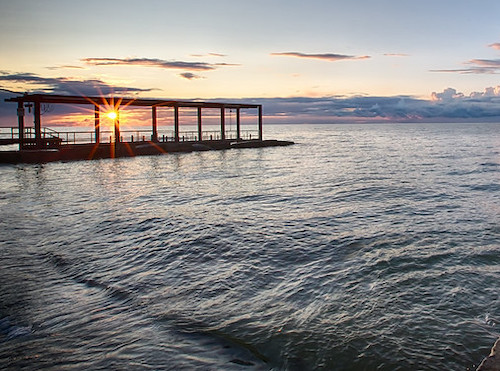Last week, a federal district court judge in Ohio declared that the city of Toledo’s move to establish a Lake Erie Bill of Rights, or LEBOR, was invalid. Judge Jack Zouhary put it this way:
Frustrated by the status quo, LEBOR supporters knocked on doors, engaged their fellow citizens, and used the democratic process to pursue a well-intentioned goal: the protection of Lake Erie. As written, however, LEBOR fails to achieve that goal. This is not a close call. LEBOR is unconstitutionally vague and exceeds the power of municipal government in Ohio.
The novel, multi-year effort to craft a Lake Erie Bill of Rights was in response to a crisis that hit the city of Toledo in 2014. Toxins seeped into the city’s water supply, triggering a three-day “Do Not Drink” advisory for some 400,000 residents. The crisis lasted from Aug. 2-4 and involved the Ohio National Guard trucking in 33,000 gallons of water, which volunteers handed out at distribution centers.
The likely culprit was a massive algae bloom in Lake Erie that had fouled the public drinking water intake three miles offshore. According to the city, the blooms are often caused by runoff from overfertilized fields, malfunctioning septic systems, or livestock pens.
But it’s not just Toledo. These toxic polluting algae blooms are a problem in 50 states – and other sites around the world – and have a spurred a massive response at all levels of U.S. government, along with projects by private conservation and research groups. In many cases, government and private environmental groups are working together, given the scope of the pollution.
It is a classic “common pool resources” problem of environmental economics, described by Garrett Hardin in his 1968 essay, “The Tragedy of the Commons”:
Even at this late date, cattlemen leasing national land on the western ranges demonstrate no more than an ambivalent understanding, in constantly pressuring federal authorities to increase the head count to the point where overgrazing produces erosion and weed-dominance. Likewise, the oceans of the world continue to suffer from the survival of the philosophy of the commons. Maritime nations still respond automatically to the shibboleth of the “freedom of the seas.” Professing to believe in “the inexhaustible resources of the oceans,” they bring species after species of fish and whales closer to extinction.
Because no one really “owns” Lake Erie, the massive pollution that is fouling the lake also reverts to the commons – you and me. That makes coming up with a solution extremely difficult, and not just in a technical sense.
LEBOR was another attempt to establish a “rights of nature” legal foundation for a problem that is already receiving tremendous attention from government and private research groups.
In the Summer 2018 issue of Religion & Liberty, Wesley J. Smith looked at how “radical environmentalists insist that flora, fauna, and even geological features and structures should be deemed legal persons, a meme known as ‘nature rights.’” Here are a couple of highlights from his article, “The return of nature worship”:
Many readers may be wondering how animals, plants, insects, rivers, granite outcroppings, bacteria, plankton and viruses – all parts of nature, after all – would enforce their rights. Here’s the ingeniously insidious part: These laws and proposals permit anyone who objects to a proposed or ongoing use of the natural world to bring a lawsuit as “nature’s” representative. Pittsburgh’s statute put it this way: “Residents of the City shall possess legal standing to enforce those rights on behalf of … natural communities and ecosystems.” In other words, the claims made to enforce nature’s “rights” would only be limited by the imaginations of the most extreme environmental activists and their lawyers. …
Anti-capitalism and anti-corporatism provide the movement’s propellant. Nature rights would make us trustees, rather than owners, of property. And here the truth begins to shine. The rights of nature is a Marxist concept, intended to destroy free markets, thwart capitalistic enterprise, shrink economies, reduce wealth and depress living standards while elevating the natural world to moral equivalence with human beings.
No word from Lake Erie on whether or not it thinks its rights have been trampled. Thank you, Judge Zouhary.
(Photo credit: rabesphoto. This photo has been cropped. CC BY 2.0.)
